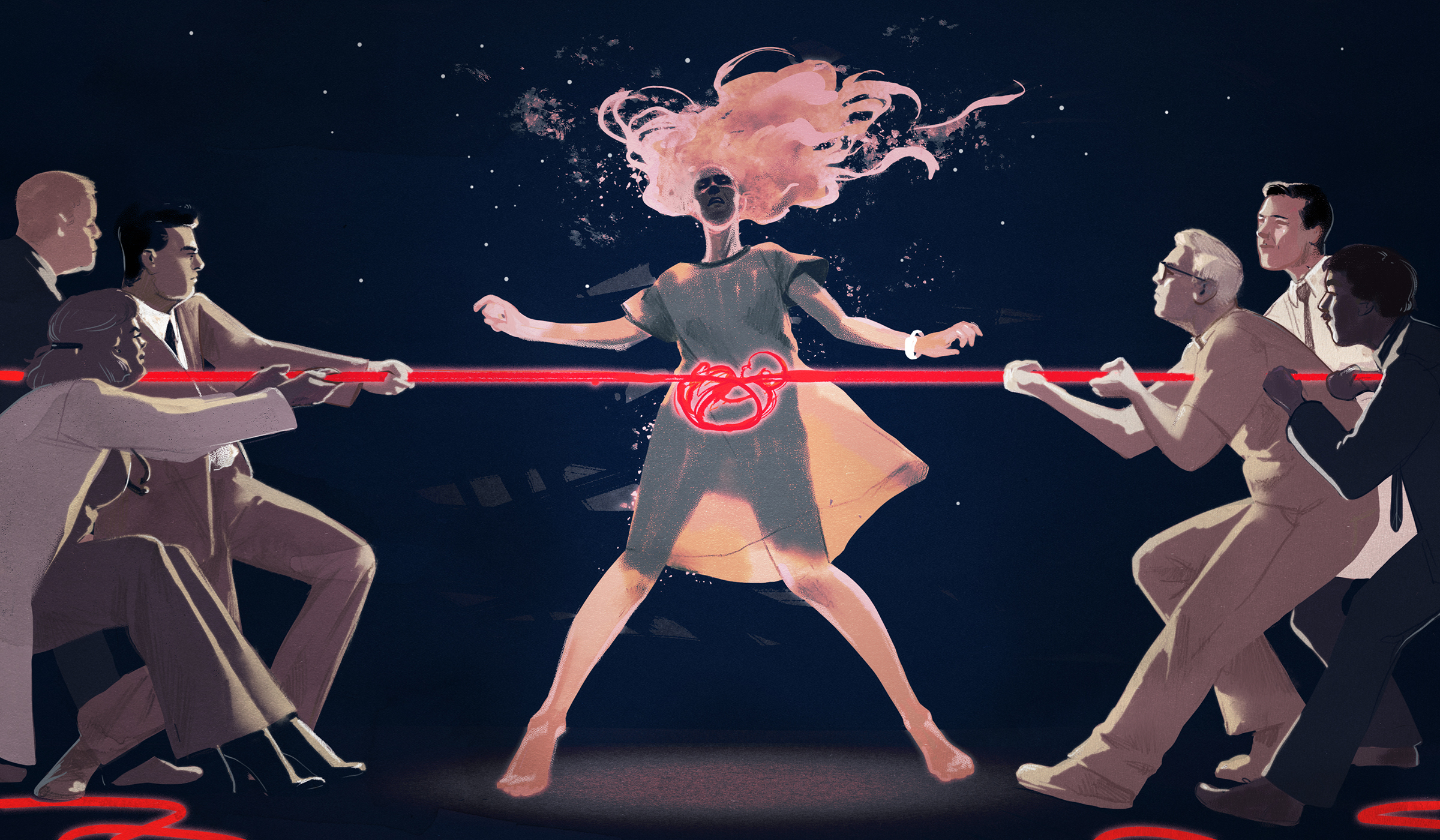
Illustration by Zoe van Dijk for GPJ
BUENOS AIRES, ARGENTINA — Norma was 20 years old and homeless when the police took her to a psychiatric hospital, where she has lived for the past five years. She was pregnant at the time and gave birth to a son a few months later.
Because Norma was in the mental health system, however, a court determined that she could not keep her baby, and he was given up for adoption. She is petitioning the court for permission to see her son and asked that her last name not be published, out of fear that it could jeopardize her case. Now she wears a necklace with a pendant of a child, as a way to remember him.
“He was very small, and he would laugh when I bathed him,” Norma says, her face lighting up.
What Norma didn’t know until a few months ago is that the court didn’t just force her to give up custody – it also prevented her from having any more children. By court order, when Norma’s doctors delivered her son by cesarean section, they also tied her fallopian tubes.
Nobody asked her if it was what she wanted.
At the end of December, after years of protests and campaigning by women’s rights groups, Argentina became the largest South American country to legalize abortion without restriction in early pregnancy. Yet even as millions of women have rallied around the slogan “my body, my choice,” many Argentine women with mental disabilities are still denied the opportunity to make their own reproductive decisions.
Doctors may sterilize women who are legally declared incompetent, according to a 2006 law, substituting their consent with authorization by the courts at the request of a family member or legal guardian. This is despite the fact that in 2008 Argentina signed the United Nations Convention on the Rights of Persons with Disabilities, which states that the will of a person with disabilities can’t be taken away.
A temporary court-appointed legal guardian requested Norma’s tubal ligation. A public curator, appointed by the state, has legal responsibility for Norma now.



There is no official record of how many people have been sterilized by court order in Argentina, but Norma’s experience is hardly an isolated case. Marcela Gasic, a social worker at a neuropsychiatric hospital in Buenos Aires, says she has worked with several women who were sterilized against their will. One of them was told of the tubal ligation when she woke after doctors performed a C-section.
“They told her that they’d tied her tubes so she wouldn’t have to go through the same thing again,” Gasic says. “As if they had done her a favor.”
Women who use the mental health system are also sometimes forced to use birth control pills or contraceptive implants, says Macarena Sabin Paz, a psychologist and coordinator of the mental health team at the Center for Legal and Social Studies, a human rights organization.
“Sexual rights, reproductive rights and the right to not reproduce are still a utopia inside of mental health institutions,” she says.
Alicia Albano, a member of the Assembly of Mental Health Patients, a patient advocacy group, experienced firsthand this lack of autonomy after she was committed to a mental health facility and medicated against her will.
“They don’t generally ask for your consent – that doesn’t apply,” Albano says. “I didn’t even know what kind of medication I was taking. The nurse puts medicine in your mouth, and then checks to make sure that you swallowed it.”
According to the Convention on the Rights of Persons with Disabilities, medical care is supposed to be provided on the basis of “free and informed consent.” Argentina’s national mental health law also specifies that involuntary hospitalization may be carried out only in cases where there is imminent risk of harm.
But women with disabilities are often viewed with prejudice, according to Carolina Buceta, a member of the Network for the Rights of Persons with Disabilities, another advocacy group.
“Society considers us asexual beings, completely innocent, or the opposite, to have an exacerbated sexuality,” Buceta says. “There’s still the belief that disabled women won’t be able to take charge of their birth control methods.”
Constanza Leone, a spokesperson for the Directorate of Sexual and Reproductive Health at the Ministry of Health, says that all parts of society hold preconceptions about people with disabilities – including the state. She says the directorate supports efforts to reform Argentina’s law to guarantee that people with disabilities have autonomy over their reproductive choices. The directorate is also working with people with disabilities and reproductive rights organizations to train health professionals to be more aware of the rights of people living with disabilities.
“We’re fighting for each individual’s informed decision over their own body to be respected, despite their age, their gender or their condition,” Leone says. “We must provide the necessary resources so that they can receive the information and choose a reversible birth control method on their own.”
Disability rights advocates are also pushing for changes to Argentina’s law to make it clear that people with disabilities are free to make their own reproductive choices, and that sterilization can be performed only with the consent of the individual.
“Let the law be changed,” Norma says. “It makes me want to cry.”
As she waits to hear whether the court will allow her to see her son, she and her primary care doctor are trying to determine whether another operation could reverse her tubal ligation.
“I want them untied,” Norma says. “I’d like to have a girl.”
Correction: This story has been updated to correctly identify Alicia Albano. Global Press Journal regrets this error.
Lucila Pellettieri is a Global Press Journal reporter based in Buenos Aires, Argentina.
Translation Note
Sarah DeVries, GPJ, translated this story from Spanish.








